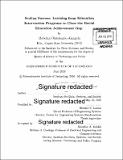Scaling Success : learning from education intervention programs to close the racial education achievement gap
Author(s)
Akinpelu, Mobolaji Olatokunbo
DownloadFull printable version (9.646Mb)
Alternative title
Learning from education intervention programs to close the racial education achievement gap
Other Contributors
Technology and Policy Program.
Advisor
Richard C. Larson.
Terms of use
Metadata
Show full item recordAbstract
An overview of American education reveals a concerning pattern: when outcomes are disaggregated by race, students from certain racial minority groups often have poorer outcomes than White students. This pattern, the racial education achievement gap, can be seen in different sorts of measures from the literature, including in the low representation of minority students at elite public institutions. To address this low representation, and to keep universities racially diverse, administrators and policymakers often turn to race-based affirmative action, the explicit (and contentious) consideration of an applicant's race in admissions decisions. College-centered education intervention programs are another tool administrators and policymakers use to address the gap reflected in elite college enrollment and to keep campuses diverse. This thesis asks how do and how can appropriately designed college-based education intervention programs help to both keep racial diversity and close the racial educational achievement gap in America's colleges? To this end, chapter one lays out the motivating issues - the gap, affirmative action, and education intervention programs; chapter two contains the case study of two successful programs, focusing on the programs' designs, the participants' experiences, and the conditions that foster academic excellence in minority students; chapter three, in part using causal loop diagrams from system dynamics modelling, makes the case for appreciating education as a complex system - one with interlocking political, economic, pedagogic, and sociocultural forces - and thus urges caution in drawing conclusions from chapter two; and chapter four, drawing from the two preceding chapters, proposes three policy recommendations to improve not just the presence of minority students at selective institutions, but, more importantly, their overall academic thriving.
Description
Thesis: S.M. in Technology and Policy, Massachusetts Institute of Technology, School of Engineering, Institute for Data, Systems, and Society, Technology and Policy Program, 2016. Cataloged from PDF version of thesis. Includes bibliographical references (pages 105-110).
Date issued
2016Department
Massachusetts Institute of Technology. Engineering Systems Division; Massachusetts Institute of Technology. Institute for Data, Systems, and Society; Technology and Policy ProgramPublisher
Massachusetts Institute of Technology
Keywords
Institute for Data, Systems, and Society., Engineering Systems Division., Technology and Policy Program.